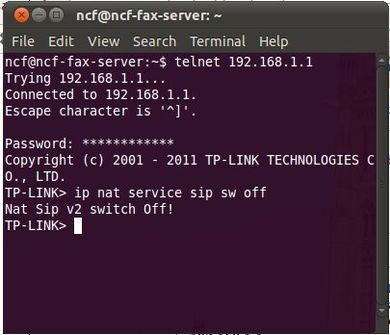Difference between revisions of "VOIP"
(→Linux: adde image) |
|||
| Line 2: | Line 2: | ||
==Using VOIP with a TP-Link modem== | ==Using VOIP with a TP-Link modem== | ||
If you are using VOIP with a TP-Link modem you may experience problems such as voice being received but not transmitted after a connection is established. This may be addressed with a command line setting change in the modem to enable this via [http://en.wikipedia.org/wiki/Telnet telnet]. | If you are using VOIP with a TP-Link modem you may experience problems such as voice being received but not transmitted after a connection is established. This may be addressed with a command line setting change in the modem to enable this via [http://en.wikipedia.org/wiki/Telnet telnet] to 192.168.1.1. | ||
ip nat service sip sw off | ip nat service sip sw off | ||
Revision as of 13:27, 2 November 2012
VOIP means Voice Over Internet Protocol, where your telephone service is provided via the internet.
Using VOIP with a TP-Link modem
If you are using VOIP with a TP-Link modem you may experience problems such as voice being received but not transmitted after a connection is established. This may be addressed with a command line setting change in the modem to enable this via telnet to 192.168.1.1.
ip nat service sip sw off
If the command is successful the following line will be returned:
nat sip v2 switch off
Accessing Telnet
Linux
On Linux operating systems you can access telnet by opening a terminal and typing in "telnet" at the prompt.
Windows
On Windows XP and Vista operating systems telnet can be accesses by using the run command and entering telnet.
Windows 7 and 8 does not support telnet out of the box, but is can be run by installing and using the PuTTY free software application.

